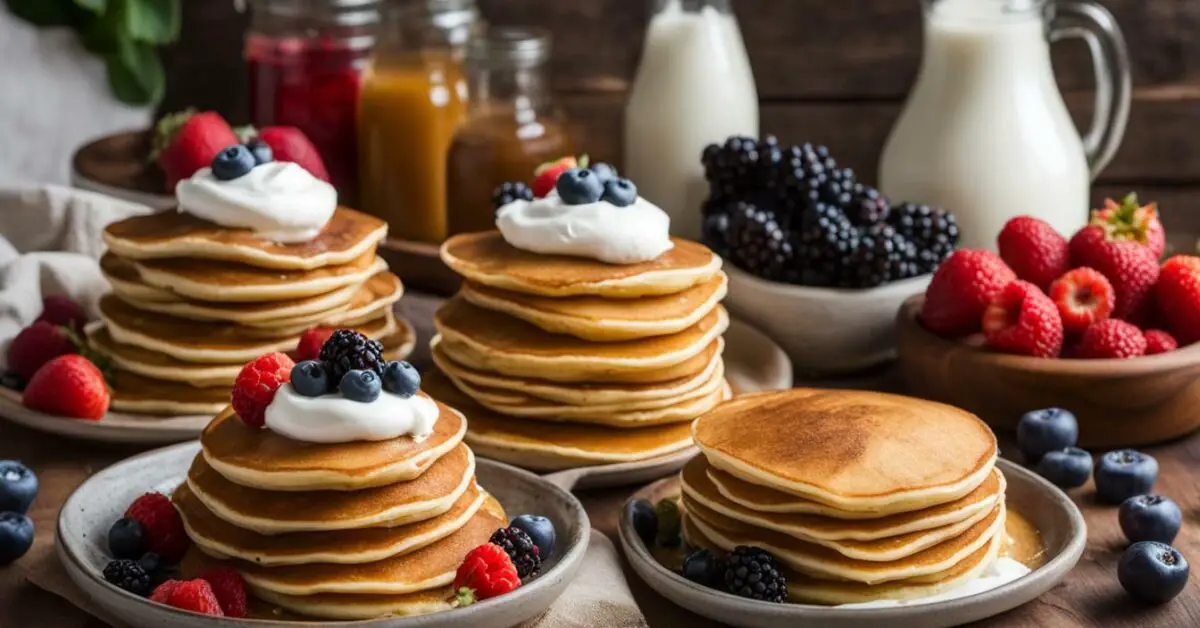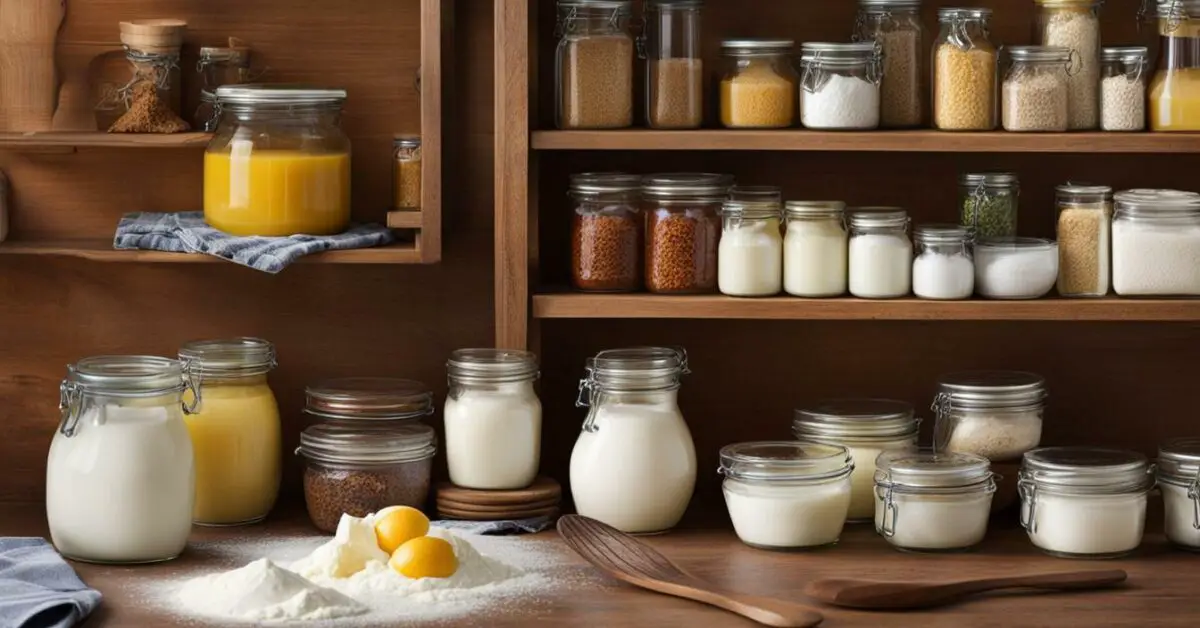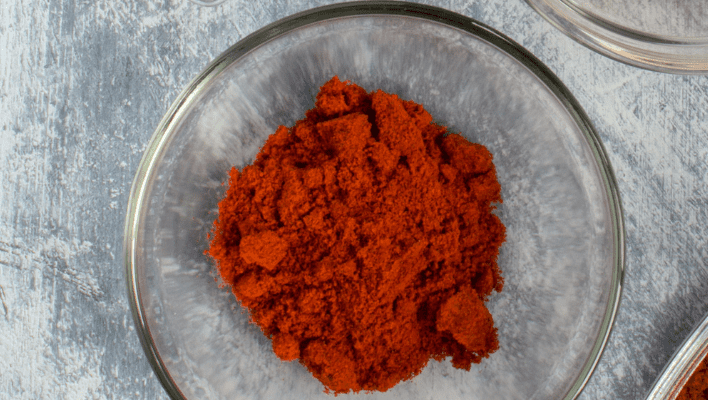
This post may contain affiliate links. Please read my disclosure for more information.
Buttermilk and Baking Soda
One substitute is buttermilk, which is acidic and can react with baking soda to produce the same leavening effect as baking powder. To substitute for 1 teaspoon of baking powder, use 1/2 cup of buttermilk and 1/4 teaspoon of baking soda.
Buttermilk is a tangy and creamy liquid that is commonly used in baking. Its acidity activates the baking soda, resulting in a light and fluffy texture in your cakes. When using this substitute, be sure to adjust the other ingredients in your recipe to maintain the desired consistency and flavor.
If you don’t have buttermilk on hand, you can easily make your own by adding 1 tablespoon of vinegar or lemon juice to 1 cup of milk and letting it sit for 5 minutes. This homemade buttermilk can then be used in place of store-bought buttermilk in the same proportions mentioned earlier.
| Ingredient | Amount | Substitute for 1 tsp of Baking Powder |
|---|---|---|
| Buttermilk | 1/2 cup | 1/4 tsp baking soda |
Summary:
- Buttermilk and baking soda can be used as a substitute for baking powder in cakes.
- Use 1/2 cup of buttermilk and 1/4 teaspoon of baking soda to replace 1 teaspoon of baking powder.
- Adjust other ingredients in your recipe accordingly.
- You can make your own buttermilk by adding vinegar or lemon juice to milk.
Now that you know how to substitute for baking powder with buttermilk and baking soda, you can confidently bake delicious cakes even if you run out of baking powder. Experiment with different recipes and enjoy the same light and fluffy results!
Plain Yogurt and Baking Soda
Another substitute is plain yogurt, which is also acidic and can react with baking soda. Use 1/2 cup of plain yogurt and 1/4 teaspoon of baking soda to replace 1 teaspoon of baking powder.
Yogurt is a versatile ingredient that not only adds moisture but also helps leaven cakes. Its acidic nature activates the baking soda, resulting in a similar rise as baking powder would provide. To ensure the best results, choose plain yogurt without any added flavors or sweeteners.
When using yogurt as a substitute, keep in mind that it may slightly alter the taste and texture of your cake. However, it can be a great option for those who prefer a tangier flavor profile. Adjusting other ingredients, such as sugar, may be necessary to maintain the balance of flavors.
Plain yogurt can work well in various cake recipes, including muffins, quick breads, and certain types of cupcakes. Experiment with different flavors and incorporate yogurt as a substitute for baking powder to add a unique twist to your creations.
| Substitute | Quantity | Replacing |
|---|---|---|
| Plain Yogurt | 1/2 cup | 1 teaspoon baking powder |
Molasses and Baking Soda
Molasses can also be used as a substitute for baking powder. Mix 1/4 cup of molasses and 1/4 teaspoon of baking soda to replace 1 teaspoon of baking powder. Keep in mind that molasses is sweet, so you may need to reduce the amount of sugar in your recipe.
Molasses, a thick, viscous syrup with a distinct flavor, can provide the necessary acidity and moisture to achieve a similar leavening effect as baking powder. When combined with baking soda, the molasses reacts to create carbon dioxide gas, resulting in the desired lift and lightness in your cakes.
When substituting molasses for baking powder, it is important to consider the sweetness of molasses. Since molasses is naturally sweet, you may need to decrease the amount of sugar in your recipe to avoid overpowering sweetness. Adjusting the sugar quantity will help maintain the balanced flavor of your cake.
| Substitute | Quantity | Replacing |
|---|---|---|
| Molasses | 1/4 cup | 1 teaspoon of baking powder |
Experimenting with molasses as a substitute can add a unique flavor profile to your cakes. It pairs well with spices like cinnamon, ginger, and nutmeg, making it an excellent choice for spiced cakes and cookies. Remember to adjust the other ingredients in your recipe accordingly to maintain the desired consistency and flavor.
Cream of Tartar and Baking Soda: A Substitute for Baking Powder in Cake
Cream of tartar is an acidic ingredient that can be used as a substitute for baking powder in cake recipes. When you find yourself without baking powder, simply combine 1/2 teaspoon of cream of tartar with 1/4 teaspoon of baking soda to replace 1 teaspoon of baking powder. This combination will provide the necessary leavening effect to make your cakes rise and achieve a light texture.
When using cream of tartar and baking soda as a substitute, it’s important to note that cream of tartar is highly acidic. This acidity activates the baking soda, allowing it to release carbon dioxide gas, which creates bubbles and causes the cake to rise. The proportions mentioned above are ideal for achieving the desired results in your cake recipe.
To ensure the cream of tartar and baking soda mixture is evenly distributed in your cake batter, you can combine them in a separate bowl and then add the mixture to the other ingredients. This will help ensure that the leavening agents are evenly dispersed throughout the batter, resulting in a uniformly risen cake.
| Baking Powder | Cream of Tartar + Baking Soda |
|---|---|
| 1 teaspoon | 1/2 teaspoon cream of tartar + 1/4 teaspoon baking soda |
Remember, when substituting cream of tartar and baking soda for baking powder, you may need to adjust other ingredients in your recipe to maintain the desired consistency and flavor. However, this substitute can be a great option when you find yourself in a pinch without baking powder, allowing you to continue baking delicious cakes with ease.
Sour Milk and Baking Soda
Sour milk, which has undergone a process known as acidification, can also be used as a substitute for baking powder in cake recipes. This acidic milk reacts with baking soda to create a similar leavening effect. To replace 1 teaspoon of baking powder, simply use 1/2 cup of sour milk and 1/4 teaspoon of baking soda.
When using sour milk as a substitute, it’s important to note that the acidity may affect the overall flavor of your cake. However, it can be a great option if you are looking for an alternative to baking powder.
Here is a table summarizing the different substitutes for baking powder in cake recipes:
| Substitute | Proportions |
|---|---|
| Buttermilk | 1/2 cup buttermilk + 1/4 teaspoon baking soda for 1 teaspoon baking powder |
| Plain Yogurt | 1/2 cup plain yogurt + 1/4 teaspoon baking soda for 1 teaspoon baking powder |
| Molasses | 1/4 cup molasses + 1/4 teaspoon baking soda for 1 teaspoon baking powder |
| Cream of Tartar | 1/2 teaspoon cream of tartar + 1/4 teaspoon baking soda for 1 teaspoon baking powder |
| Sour Milk | 1/2 cup sour milk + 1/4 teaspoon baking soda for 1 teaspoon baking powder |
| Vinegar | 1/2 teaspoon vinegar + 1/4 teaspoon baking soda for 1 teaspoon baking powder |
| Lemon Juice | 1/2 teaspoon lemon juice + 1/4 teaspoon baking soda for 1 teaspoon baking powder |
| Club Soda | Use as a liquid replacement in your recipe |
| Self-Rising Flour | Replace regular flour with self-rising flour, omit baking powder and baking soda |
| Whipped Egg Whites | Fold foamy egg whites into the batter |
Remember to adjust the other ingredients in your recipe as needed to maintain the desired consistency and flavor. These substitutions can help you create delicious cakes even without baking powder!
Vinegar and Baking Soda
Vinegar is another acidic ingredient that can react with baking soda to create a leavening effect in your cake. To substitute for 1 teaspoon of baking powder, you will need 1/2 teaspoon of vinegar and 1/4 teaspoon of baking soda. This combination helps to create the necessary rise and lightness in your baked goods.
Incorporating vinegar and baking soda as a substitute for baking powder is simple. Just mix the vinegar and baking soda together and add them to your recipe as you would baking powder. The acid in the vinegar reacts with the baking soda, releasing carbon dioxide gas, which helps your cake to rise. It’s important to note that using vinegar can add a slight tangy flavor to your cake, so it works best in recipes where this flavor is complementary.
When using vinegar and baking soda as a substitute for baking powder, it’s important to adjust the other ingredients in your recipe accordingly. While the leavening effect will be similar, the overall taste and texture may differ slightly. Experimentation and recipe adjustments may be necessary to achieve the desired results.
| Vinegar | Baking Soda | Baking Powder |
|---|---|---|
| 1/2 teaspoon | 1/4 teaspoon | 1 teaspoon |
Remember to always measure accurately when substituting vinegar and baking soda for baking powder. Too much or too little of either ingredient can affect the final outcome of your cake. By following the proportions provided, you can confidently use vinegar and baking soda as a substitute for baking powder in your cake recipes.
Other Substitutes: Lemon Juice, Club Soda, Self-Rising Flour, and Whipped Egg Whites
Other substitutes for baking powder in cakes include lemon juice, club soda, self-rising flour, and whipped egg whites. These ingredients can add volume and texture to your baked goods without the use of baking powder.
Lemon juice, which is high in citric acid, can replace baking powder in recipes that only call for a small amount. Use 1/2 teaspoon of lemon juice and 1/4 teaspoon of baking soda to replace 1 teaspoon of baking powder. The acidity of the lemon juice reacts with the baking soda to create a leavening effect.
Club soda can be used to add volume to baked goods without the use of baking powder. Replace any liquid in your recipe with club soda to achieve a lighter texture. The carbonation in the club soda helps to aerate the batter, resulting in a fluffier texture.
If you have self-rising flour on hand, you can use it as a substitute for baking powder. Simply replace the regular flour in your recipe with self-rising flour and omit the baking powder and baking soda. Self-rising flour already contains baking powder, so it will help to leaven your cake.
Whipped egg whites can also be used as a substitute for baking powder. Beat the egg whites until they’re foamy and then gently fold them into your batter. This method works best for recipes like soufflés, pancakes, meringues, and certain types of cakes. The whipped egg whites create a light and airy texture in the final baked goods.
| Substitute | Proportion | Usage |
|---|---|---|
| Lemon Juice | 1/2 teaspoon lemon juice + 1/4 teaspoon baking soda | Recipes calling for a small amount of baking powder |
| Club Soda | Replace any liquid in the recipe with club soda | To add volume and lighten the texture |
| Self-Rising Flour | Replace regular flour in the recipe with self-rising flour | To replace both baking powder and baking soda |
| Whipped Egg Whites | Foam the egg whites and gently fold into the batter | For soufflés, pancakes, meringues, and certain cakes |
These alternatives to baking powder offer a range of options for achieving a leavened cake without the use of traditional baking powder. Experiment with different substitutes to find the one that best suits your taste and dietary preferences. Remember to adjust other ingredients in the recipe as needed to maintain the desired consistency and flavor.
Conclusion
These are 10 great ways to substitute for baking powder in cake recipes. Remember to adjust the other ingredients in your recipe as needed to maintain the desired consistency and flavor.
Baking powder is a common ingredient used to add volume and lighten the texture of baked goods. If you don’t have baking powder on hand, there are several substitutes you can use.
One substitute is buttermilk, which is acidic and can react with baking soda to produce the same leavening effect as baking powder. To substitute for 1 teaspoon of baking powder, use 1/2 cup of buttermilk and 1/4 teaspoon of baking soda.
Another substitute is plain yogurt, which is also acidic and can react with baking soda. Use 1/2 cup of plain yogurt and 1/4 teaspoon of baking soda to replace 1 teaspoon of baking powder.
Molasses can also be used as a substitute for baking powder. Mix 1/4 cup of molasses and 1/4 teaspoon of baking soda to replace 1 teaspoon of baking powder. Keep in mind that molasses is sweet, so you may need to reduce the amount of sugar in your recipe.
Cream of tartar is an acidic ingredient that can be used as a substitute for baking powder. Use 1/2 teaspoon of cream of tartar and 1/4 teaspoon of baking soda to replace 1 teaspoon of baking powder.
Sour milk, which has undergone a process known as acidification, can also be used as a substitute. Use 1/2 cup of sour milk and 1/4 teaspoon of baking soda to replace 1 teaspoon of baking powder.
Vinegar is another acidic ingredient that can react with baking soda. Use 1/2 teaspoon of vinegar and 1/4 teaspoon of baking soda to replace 1 teaspoon of baking powder.
Lemon juice, which is high in citric acid, can replace baking powder in recipes that only call for a small amount. Use 1/2 teaspoon of lemon juice and 1/4 teaspoon of baking soda to replace 1 teaspoon of baking powder.
Club soda can be used to add volume to baked goods without the use of baking powder. Use club soda to replace any liquid in your recipe.
Self-rising flour can be used as a substitute for baking powder. Just replace the regular flour in your recipe with self-rising flour and omit the baking powder and baking soda.
Whipped egg whites can also be used as a substitute for baking powder. Beat the egg whites until they’re foamy, and then gently fold them into your batter. This method works best for soufflés, pancakes, meringues, and certain types of cakes.
These alternatives provide options for those in need of a substitute for baking powder in cake recipes. Remember to experiment and adjust the other ingredients in your recipe to maintain the desired consistency and flavor. Happy baking!
FAQ
Can I use buttermilk and baking soda as a substitute for baking powder in cake?
Yes, buttermilk can be used as a substitute for baking powder. Simply mix 1/2 cup of buttermilk and 1/4 teaspoon of baking soda to replace 1 teaspoon of baking powder.
How can I use plain yogurt and baking soda as a substitute for baking powder in cake?
Plain yogurt is another substitute for baking powder. Use 1/2 cup of plain yogurt and 1/4 teaspoon of baking soda to replace 1 teaspoon of baking powder.
Can I use molasses as a substitute for baking powder in cake?
Yes, molasses can be used as a substitute for baking powder. Mix 1/4 cup of molasses and 1/4 teaspoon of baking soda to replace 1 teaspoon of baking powder. Remember to adjust the amount of sugar in your recipe.
How can I use cream of tartar and baking soda as a substitute for baking powder in cake?
Cream of tartar can be used as a substitute for baking powder. Use 1/2 teaspoon of cream of tartar and 1/4 teaspoon of baking soda to replace 1 teaspoon of baking powder.
Can I use sour milk and baking soda as a substitute for baking powder in cake?
Yes, sour milk can be used as a substitute for baking powder. Use 1/2 cup of sour milk and 1/4 teaspoon of baking soda to replace 1 teaspoon of baking powder.
How can vinegar and baking soda be used as a substitute for baking powder in cake?
Vinegar can be used as a substitute for baking powder. Use 1/2 teaspoon of vinegar and 1/4 teaspoon of baking soda to replace 1 teaspoon of baking powder.
Are there any other substitutes for baking powder in cake?
Yes, there are several other substitutes you can use. Lemon juice, club soda, self-rising flour, and whipped egg whites can also be used. Adjustments in proportions and recipe type may be necessary for each substitute.
Is it possible to bake a cake without using any baking powder?
Yes, you can bake a cake without using baking powder by using one of the substitutes mentioned above or by omitting it altogether and relying on other leavening agents in the recipe.


